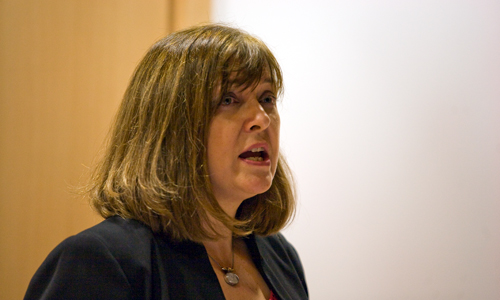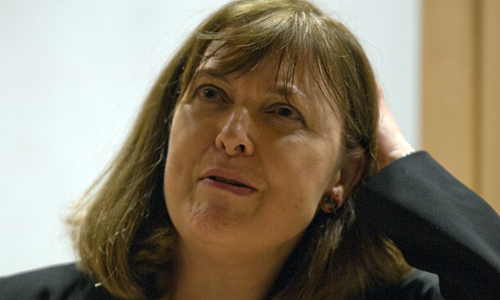“If you are a journalist it is your job to tell people what they didn’t know before. You are a particular target for any number of people.” Bridget Kendall, diplomatic correspondent for the BBC, visited the University on the 2nd of March to give a lecture on “Journalism in an age of spin”.
Pro-vice Chancellor, Mike Saks, welcomed Bridget Kendall with information about the University of Lincoln and its recent successes; a plug that would later support one of Ms Kendall’s points on spin. She opened with a description of the popular perception of spin: “Spin is such an interesting word. It’s a word that has become notorious, especially when talking about governments. It is synonymous for many with lies, distortion or even omissions to mislead journalists, and through them, the public… for journalists who fall prey to it — spin is a dangerous game.”
Kendall was quick to point out that whilst some spin is negative, it’s not necessarily all bad: “Let’s not forget that not all spin is political. A lot of it is not ill-intentioned. We just had a very good example from the Pro-vice chancellor. You can find spin in many contexts. It’s not people telling you outright lies, which they know not to be true. It’s just a subtle process of trying to influence; someone trying to get you to see their point of view.”

Bridget Kendall urges journalists to keep their wits about them, owing to their position: “If you are a journalist it is your job to tell people what they didn’t know before. You are a particular target for any number of people. Lobbyists, of one kind or another, are going to try to get your attention to get you to publicise their cause or argument or draw attention to their name or face. You’ll be approached by individuals who want to promote their ideas or name, organisations that want publicity… all of which will be wanting some kind of spin.”
Kendall also warned journalists to think carefully about your source before publishing a story; “You need to bear in mind that as a journalist, any information you get and put in the public domain will come from a certain angle. You, as a journalist, have a particular responsibility to consider where it came from and to consider its problems.” As much as Bridget Kendall promotes vigilance with your sources with healthy scepticism, she warns not to let this develop into “cynicism”.
She also highlighted a couple of ways in which people attempt to get journalists to put extra emphasis on their agenda: “There is spin which amounts to an attempt to distract. You’ll get a phone call from a press officer, for example, who will try to shift your attention towards a marginal event and away from something else… Another way is blatant spin. This can sometimes be very useful. When a government’s message is straight, it’s very important to know what it is. A party official who doggedly feeds you the party line is doing you a favour in some ways… One way is the early leaking of bad news, to weaken the shock of a later announcement. This is to gauge the reaction of journalists and so the likely impact on the public at large.”
Curriculum Vitae

Bridget Kendall, a Visiting Professor at the University of Lincoln, has been BBC diplomatic correspondent since 1998. She is London-based and covers top foreign stories for radio, television and online news. She reports on a wide range of international diplomatic and security issues, but has a particular interest and expertise in Russia and East/West relations, dating from when she was BBC Moscow correspondent at the time of the collapse of the Soviet Union.
In the last ten years she has followed daily diplomatic and military developments from London in the run up to and during the 2003 war in Iraq, the war in Afghanistan, and the war in Kosovo. She also reported from the ground during the military crises in Macedonia and Chechnya. She has traveled frequently with the British Foreign Secretary, including on official trips to Iraq and Afghanistan, Pakistan, Darfur and Iran.
From 1994-98 she was the BBC’s Washington correspondent; from 1989-94 the BBC’s Moscow correspondent and from 1983-89 she was a BBC reporter and producer for news and current affairs programmes. She studied from 1974-78 at Lady Margaret Hall, Oxford; from 1976-77 at Voronezh State University, USSR; from 1978-80 at Harvard, USA; from 1980-83 at St Antony’s College, Oxford; and from 1981-82 at Moscow State University. Bridget Kendall was awarded an MBE in the 1994 New Year’s Honours list.
